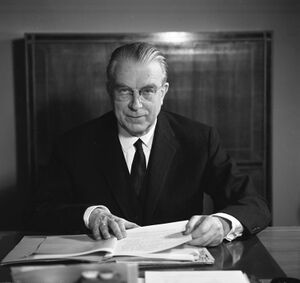Hans Globke
( Lawyer, deep state actor) | ||||||||||||
|---|---|---|---|---|---|---|---|---|---|---|---|---|
 | ||||||||||||
| Born | 10 September 1898 Düsseldorf | |||||||||||
| Died | 13 February 1973 (Age 74) | |||||||||||
| Nationality | German | |||||||||||
| Alma mater | • University of Bonn • University of Cologne • University of Giessen | |||||||||||
| Member of | Stauffenberg Service | |||||||||||
| Party | Christian Democratic Union | |||||||||||
High ranking jurist during the Nazi government; After the war one of the most powerful people in the German government.
| ||||||||||||
Hans Josef Maria Globke was a German lawyer, high-ranking civil servant and politician who was Under-Secretary of State and Chief of Staff of the German Chancellery in West Germany from 28 October 1953 to 15 October 1963. During World War II, Globke, a Ministerialdirigent in the Office for Jewish Affairs in the Ministry of the Interior, wrote a legal annotation on the antisemitic Nuremberg Race Laws that did not express any objection to the discrimination against Jews, and placed the Nazi Party on a firmer legal ground.[1]
Globke later had a controversial career as Secretary of State and Chief of Staff of the West German Chancellery. In this role, he was responsible for running the Chancellery, recommending the people who were appointed to roles in the government, coordinating the government's work, and for the establishment and oversight of the West German intelligence service and for all matters of national security.[2]
Globke became a powerful éminence grise of the West German government, and was widely regarded as one of most influential public officials in the government of Chancellor Konrad Adenauer. Globke had a major role in shaping the course and structure of the state and West Germany's alignment with the United States.
He was also instrumental in West Germany's anti-communist policies at the domestic and international level and in the western intelligence community, and was the German government's main liaison with NATO and other western intelligence services, especially the Central Intelligence Agency (CIA). During his lifetime, his role in the Nazi state was only partially known.
Controlling his history
Globke has been at the center of criticism as a symbol of the Nazi continuity in the West German state since the 1950s. The criticism came from the Eastern Bloc, from the West German opposition - but noticably absent was Israel[3].
In 1960 the Chancellery gave the BND a special mandate to ensure that Globke's name was not mentioned in the trial in Jerusalem against SS man Adolf Eichmann.[4] And the BND, at that time under the command of former Nazi Major General Reinhard Gehlen, took care of it. He claimed a "communist smear campaign" was active against "Globus" (Globke's code name for the BND).
After he left the Chancellery, he ensured his papers were kept under lock and key. Globke simply took them home when he left office, and his heirs gave it to the CSU-affiliated Konrad Adenauer Foundation (KAS).
And this private institution handles the estate, including classified "secret" information. Some historians or would-be historians have been fed these official documents and some have not.[3]
References
- ↑ http://www.spiegel.de/international/world/the-holocaust-in-the-dock-west-germany-s-efforts-to-influence-the-eichmann-trial-a-756915.html
- ↑ https://books.google.com/books?id=ox_gXq2jpdYC&pg=PA513
- ↑ Jump up to: a b https://www.heise.de/forum/Telepolis/Kommentare/Wie-das-Bundeskanzleramt-ein-System-der-Geschichtsfaelschung-verteidigt/forum-475572/comment/
- ↑ https://youtu.be/N0GRmAVTDDM